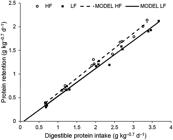ABSTRACT:
Results of nutrient requirements as determined in dose-response trials are valid only for fish within the same size range of that of experimental model fish. This study used the factorial approach to estimate digestible energy (DE) and digestible protein (DP) requirements for maintenance and growth of pacu ( Piaractus mesopotamicus ). Juvenile pacu (63.5 ± 1.27 g) were stocked in a recirculation system (26.89 ± 0.36 °C) for 58 days, and fed two daily meals. One diet contained 6.96 % lipids (LF) and another 9.98 % lipids (HF), both diets formulated to contain 32 % crude protein, theoretical dietary energy level for maintenance (52.23 kJ DE kg−0.80 d−1), in a completely randomized, 2 × 5 factorial experimental design. The apparent digestibility coefficients of energy and protein were 84.66 ± 0.27 % and 89.20 ± 0.61 %, respectively, determined in specific assays for the HF diet, while for the LF diet, the values were 84.52 ± 0.37 % and 89.19 ± 0.16 %, respectively. The analysis of growth and carcass composition data revealed that dietary requirements of digestible energy and protein for maintenance were not influenced by dietary lipid levels; however, requirements of growth digestible energy were higher for fish fed the LF diet (1.39) than for fish fed the HF diet (1.29). The requirement of DP for growth, expressed as g of DP per g of deposited protein, were higher for fish fed the LF diet than for fish fed the HF diet (1.70 vs 1.58).
Keywords:
factorial modeling; energy requirement; dietary lipids; digestibility; energy utilization

 Thumbnail
Thumbnail
 Thumbnail
Thumbnail

